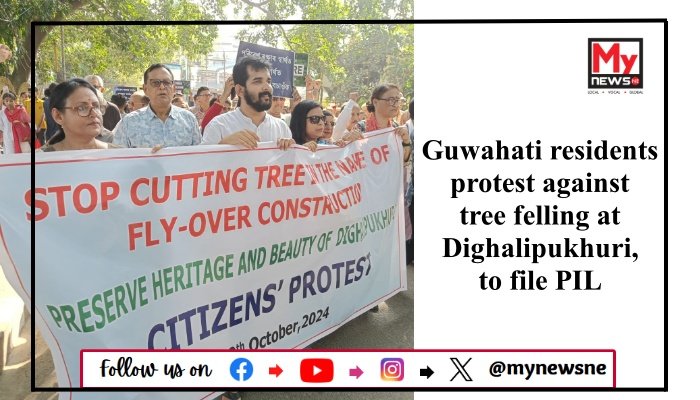Guwahati Residents Protest Tree Felling for Flyover, Call for Environmental Preservation
Guwahati— In a united stand against urban development at the expense of greenery, residents of Guwahati gathered to protest the large-scale felling of trees at Dighalipukhuri, an area slated for a new flyover connection to Noonmati.
The protestors voiced their deep concerns over the loss of essential trees that contribute to the local ecosystem and overall environmental health.
The initiative to cut down approximately 30 trees has ignited significant discontent among locals, who argue that alternative solutions should be explored that do not involve the destruction of such vital natural resources.
Plans are underway for protestors to file a Public Interest Litigation (PIL) to halt the tree-cutting activities, emphasizing the need for authorities to prioritize ecological considerations in urban planning.
Dighalipukhuri, known for its historic pond and lush green cover, holds both ecological and cultural significance in the city. The trees scheduled for removal are crucial for providing shade during the scorching summer months and serve as habitats for rare migratory birds, thereby enhancing biodiversity within the urban landscape.
Local resident and Congress leader Mira Borthakur highlighted the urgency of the matter, stating, “If the environment is not preserved, how will we survive? If Himanta Biswa Sarma does not listen to the voices and concerns of the citizens, what is the use of the flyover when we have alternative routes? The people of Dighalipukhuri demand that the serenity of the area be kept intact.”
Following the protest rally, Borthakur announced plans for a suo moto PIL to be filed, gathering signatures from the local community to support the cause.
The construction of a nearly six-mile-long flyover connecting the Reserve Bank to Noonmati is already in progress, but the project has faced backlash after recent design changes included the Tayabullah Road, potentially threatening the heritage and beauty of Dighalipukhuri. On October 28, authorities marked around 25 trees along Tayabullah Road and in front of Handique Girls’ College with yellow crosses, including several that are reportedly over 200 years old.
The Public Works Department (PWD) has come under scrutiny after an inquiry revealed that no environmental impact study had been conducted regarding the potential consequences of the flyover on Dighalipukhuri’s surroundings, nor had any public hearing been held. The marking of these trees, which play a crucial role in the city’s ecology, has alarmed nature enthusiasts and concerned citizens alike.
Earlier this month, students from Cotton University also protested against the felling of century-old trees at Dighalipukhuri, urging the government to prioritize environmental preservation over infrastructure development.
This incident underscores a larger debate in urban planning: finding the balance between necessary infrastructure growth and the preservation of vital green spaces and environmental health in rapidly urbanizing regions like Guwahati.

